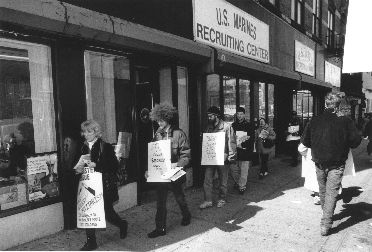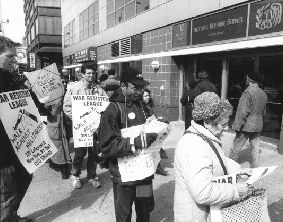The
Federal Hearing
and Anti-Militarism Walk
• March
5, 1999 •
| In Brief: Most of the 20-minute hearing was spent by the judge persistently grilling the U.S. attorney with questions regarding the Fifth amendment. In the end, the judge asked Hedemann to go once again to the IRS office and assert the Fifth question-by-question rather than in a "blanket" manner. The judge hinted that the IRS might want to drop the whole matter after that, fully expecting Ed to assert the Fifth for everything except his name and address. As an aside, the U.S. attorney raised the specter of the IRS granting Ed immunity [thus removing the Fifth as a reason not to turn over documents]. |
Anti-Militarism
Walk Through Brooklyn
About 20 to 25 of us gathered
at 11 am on March 5, 1999, in front of the military recruiting
offices in downtown Brooklyn to picket and leaflet. The recruiters
were mildly amused by the activity. After a half hour, we began the mile-walk
(see map) to Federal Courthouse, first with
a 20-minute stop at the IRS building for more picketing
and leafleting before continuing our walk through the downtown shopping
area of Brooklyn. While at the IRS, a couple groups of young school children
came by, very curious about what we were doing. The teacher of one group
stopped to explain to the kids what the issues were, then he even joined
us in chanting "We are not willing to pay for killing."
|
|
Picket
and leafleting outside the military recruiters |
.
. . in front of Brooklyn IRS building |
We reached the Federal Courthouse at about 12:30 after
passing out about 1000 WRL
tax pie charts and 1000 leaflets printed for the occasion.
We paused just outside to gather as a group, hung our signs on the plywood
fence surrounding an adjoining construction site. This attracted the
attention of Federal guards inside who came out to find out what was
going on and ask us to remove the signs. As we filed into the courthouse
it was clear that we had been expected. More than the usual complement
of guards were on duty to process us through the metal detectors and
scanners. A couple of guards, thinking they were out of earshot, discussed
whether it was possible to keep the "protesters from coming inside"
but decided that we had a "constitutional" right to go in.
We were allowed to place our signs in corner just inside the entrance
such that we could retrieve them later.
The
Federal Hearing
As we reached the courtroom on the
top floor, we were told that the front two rows (out of 10) were for
the U.S. Marshals. There appeared to be about 10 of them (for "regular" cases
there might not be any marshals). About 50 of us were on hand for the
half hour we were in the courtroom. It seems they were preparing for
protests or possible disruption of court decorum.
The U.S. attorney showed up just before the 1 pm scheduled start of
the hearing. The judge entered the courtroom a few minutes later, but
without the formal announced "all rise." Many of us remained
seated not in disrespect to the judge but in the belief that all people
are equal--neither above or below anyone else. After asking Hedemann
and U.S. attorney Levy to approach the bench, Judge Amon immediately
launched into a persistent questioning of Levy about the Fifth amendment.
Most of the 20-minute hearing was question-response between the judge
and U.S. attorney. The judge was clearly not satisfied by the government's
position on the Fifth and what would be gained by having Ed return
to the IRS only to respond with the Fifth item-by-item to each IRS
question.
Among the Judge's
Questions: What exactly does the government expect
her (the judge) to order Hedemann to do--go to the IRS office again?
Answer the questions item by item? Produce documents? Wouldn't that
process be incriminating? How does the IRS determine what's proper
to claim the Fifth on and what isn't?
Among the U.S. Attorney's Responses: The IRS has many levels
in their process to evaluate what's an appropriate use of the Fifth. Because
she doesn't work there she doesn't know all those processes. The IRS will determine
whether it will grant immunity.
Then the judge turned to Ed to ask if he could meet once again with the IRS and assert the Fifth item-by-item where he wanted. It seems she wants to allow the IRS this procedural step and then if the case returns to court she will decide if the IRS has come up with any more substantial arguments regarding why the Fifth amendment would not apply. Ed agreed to thism and with U.S. Attorney Levy set March 8, 1999, as the date to meet with the IRS.
Witness Fees. At
this point the judge appeared ready to end the hearing when Ed raised
the issue of witness fees. [The IRS owes $40 for each summons appearance
as a witness fee; something that few people are aware of and if it
became better known, in the view of some observers, might discourage
indiscriminate issuing of summonses by the government. The government's
position: no witness fees were owed since Ed didn't answer the IRS's
questions.] The judge asked the U.S. attorney about this, and she responded
that he has to answer questions first and that if the fee were granted it
would be taken out of money he owes the IRS. The judge wanted
to see paperwork on that and indicated that she would rule on the witness
fee issue later.
Political and Moral Issues. Again as the judge appeared to
want to wrap up the proceedings, Ed raised the "military spending" and
his having
"already paid the taxes" issues that he had in his January 21, 1999,
written brief, which were dismissed by the government in its March 1, 1999,
written response. The judge said that the Fifth amendment was the only issue
she felt was appropriate for this summons enforcement hearing and would not
deal with the other issues. She said they might be appropriate in a criminal
proceeding but not now. At that point the hearing was ended.
During the milling around in the courtroom as we got up to leave, Ed
announced that we should gather outside the courthouse for a group photo.
He invited the marshals and other court officials to join us. They demurred
(but found it all quite amusing).
After the hearing on March 5, 1999. |
Last updated 3/12/99
return to U.S. v. Hedemann page


